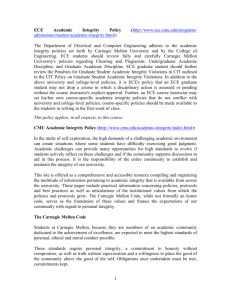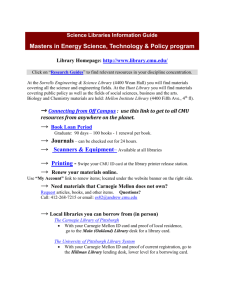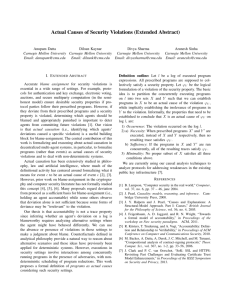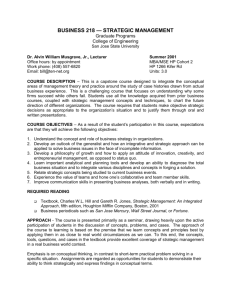Course Syllabus
advertisement
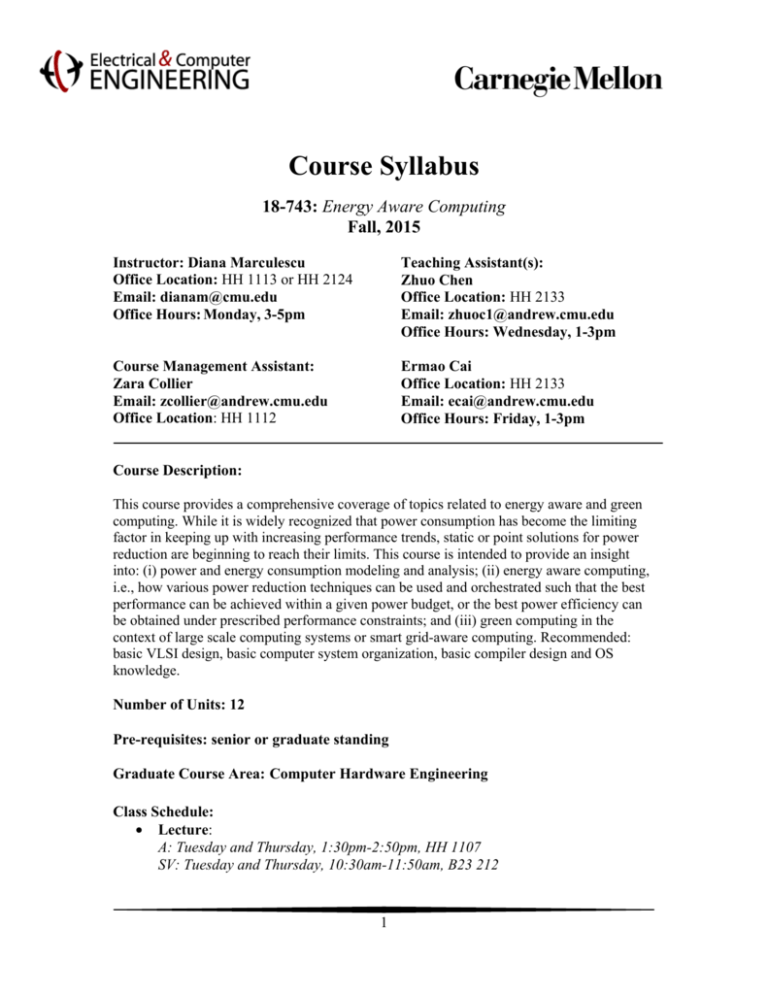
Course Syllabus 18-743: Energy Aware Computing Fall, 2015 Instructor: Diana Marculescu Office Location: HH 1113 or HH 2124 Email: dianam@cmu.edu Office Hours: Monday, 3-5pm Teaching Assistant(s): Zhuo Chen Office Location: HH 2133 Email: zhuoc1@andrew.cmu.edu Office Hours: Wednesday, 1-3pm Course Management Assistant: Zara Collier Email: zcollier@andrew.cmu.edu Office Location: HH 1112 Ermao Cai Office Location: HH 2133 Email: ecai@andrew.cmu.edu Office Hours: Friday, 1-3pm Course Description: This course provides a comprehensive coverage of topics related to energy aware and green computing. While it is widely recognized that power consumption has become the limiting factor in keeping up with increasing performance trends, static or point solutions for power reduction are beginning to reach their limits. This course is intended to provide an insight into: (i) power and energy consumption modeling and analysis; (ii) energy aware computing, i.e., how various power reduction techniques can be used and orchestrated such that the best performance can be achieved within a given power budget, or the best power efficiency can be obtained under prescribed performance constraints; and (iii) green computing in the context of large scale computing systems or smart grid-aware computing. Recommended: basic VLSI design, basic computer system organization, basic compiler design and OS knowledge. Number of Units: 12 Pre-requisites: senior or graduate standing Graduate Course Area: Computer Hardware Engineering Class Schedule: • Lecture: A: Tuesday and Thursday, 1:30pm-2:50pm, HH 1107 SV: Tuesday and Thursday, 10:30am-11:50am, B23 212 1 Required Textbook: None Suggested Reading: (you do not have to buy these books!) • Low Power Electronics Design, by C. Piguet (ed.) (ISBN 0849319412) • Power Aware Computing, by R. Melhem, R. Graybill (eds.) (May 2002, ISBN 0-306-467860) • Power Aware Design Methodologies, by M. Pedram, J.M. Rabaey (eds.) (June 2002, ISBN 1-4020-7152-3) Other Supplemental Materials: Reading material will be distributed in class and/or will be available on the Blackboard electronically Course Blackboard: To access the course blackboard from an Andrew Machine, go to the login page at: http://www.cmu.edu/blackboard. You should check the course blackboard daily for announcements and handouts. Course Wiki: Students are encouraged to use the ECE wiki to provide feedback about the course at: http://wiki.ece.cmu.edu/index.php. Grading Algorithm: 30% Homework* Presentation & Discussion 15% 55% 10% - in-class presentation 5% - Q&A participation during presentation session Project 15% - each of the two intermediate project reports/presentations/demos 25% - the final project report/presentation/demo *NO LATE HOMEWORKS WILL BE ACCEPTED. Policy on Homeworks: The primary purpose of the homeworks is to help you master the material and prepare for the projects and exams. We encourage you to work together with your classmates to help you understand the basic concepts. However, you are required to do your own homework. Homeworks are due at the beginning of class. No late homework assignments will be accepted. Policy on Projects: The project is designed to 1) help you understand and synthesize all of the course concepts; 2) demonstrate your abilities at correctly stating and implementing the project’s goals; 3) demonstrate your ability to explore and incorporate good engineering trade-offs in a system/subsystem implementation. All project components should clearly identify the individual contributions of each team member. Any project proposal, report or presentation can be submitted up to 5 days late, but is subject to a 10% per day late penalty. The 10% penalty is computed based on the maximum number of points, not on your actual achieved score. No other extensions will be given. 2 Tentative Course Calendar Date Day September 1 Tues. 3 Thur. 8 Tues. 10 Thur. 15 Tues. 17 22 24 29 October 1 6 Thur. Tues. Thur. Tues. Thur. Tues. 8 Thur. 13 Tues. 15 20 Thur. Tues. 22 Thur. 27 Tues. 29 Thur. November 3 Tues. 5 Thur. 10 Tues. 12 Thur. 17 Tues. 19 24 Thur. Tues. 26 Thur. December 1 Tues. 3 Thur. 8 10 Tues. Thur. Lecture topic Introduction Power consumption basics Gate/RT-level power modeling Paper presentations Gate/RT-level power optimization/management Microarchitecture power modeling Microarchitecture-driven power management I Paper presentations Project presentations I Project presentations II Microarchitecture-driven power management II Energy awareness and uncertainty in design I Energy awareness and multi-clock design Paper presentations Software power consumption: Modeling and source code optimization Compile-time power reduction techniques Project Presentation I Project Presentations II System level power modeling Paper presentations System level power management I System level power management II Energy awareness and uncertainty in design II Paper presentations Green computing and green data centers No Classes, Thanksgiving Break Energy aware & green computing in the smart grid Summary & directions for the future Paper presentations Final Project posters and demos Homework Project Paper Presentation 1 out Project topics out Session I Project proposal due 1 due/2 out Session II Group 1 1st report due Oct. 2 Group 2 1st report due Oct. 2 2 due/3 out Session III 3 due/4 out Group 2 Group 1 2nd report due Oct. 30 Session IV 4 due/5 out Session V 5 due/6 out Session VI 6 due Dec. 11 3 Final report due Dec. 18 Education Objectives (Relationship of Course to Program Outcomes) (a) an ability to apply knowledge of mathematics, science, and engineering: Students will apply existing knowledge on basic VLSI/computer organization design for determining low power and energy aware design. (b) an ability to design and conduct experiments, as well as to analyze and interpret data: Students will have a project, several homeworks and paper presentations during which either simulators will be used/modified/developed, or existing work will be presented and analyzed critically. (c) an ability to design a system, component, or process to meet desired needs within realistic constraints such as economic, environmental, social, political, ethical, health and safety, manufacturability, and sustainability: Students will be exposed to design constraints related to low power, energy aware, and green computing. (d) an ability to function on multi-disciplinary teams: Students are expected to complete a project in a team. (e) an ability to identify, formulate, and solve engineering problems: Students will complete homework assignments and project reports during which low power and energy aware design solutions will be required. (f) an understanding of professional and ethical responsibility: All work performed in this class is subject to CMU policies on academic integrity. (g) an ability to communicate effectively: Students will present and critically analyze research papers in this field, as well as present their own projects via several oral presentation sessions and written reports. (h) the broad education necessary to understand the impact of engineering solutions in a global, economic, environmental, and societal context: Students will be exposed to principles of energy aware/green computing. (j) a knowledge of contemporary issues: Students will revise and be exposed to generic trends in electronics and computing, in particular energy, cost, and reliability of emerging integrated systems. (k) an ability to use the techniques, skills, and modern engineering tools necessary for engineering practice: Students will get familiarized and use academic and commercial tools for low power design, energy aware and reliable computing. ECE Academic Integrity Policy admissions/masters/academic-integrity.html): 4 (http://www.ece.cmu.edu/programs- The Department of Electrical and Computer Engineering adheres to the academic integrity policies set forth by Carnegie Mellon University and by the College of Engineering. ECE students should review fully and carefully Carnegie Mellon University's policies regarding Cheating and Plagiarism; Undergraduate Academic Discipline; and Graduate Academic Discipline. ECE graduate student should further review the Penalties for Graduate Student Academic Integrity Violations in CIT outlined in the CIT Policy on Graduate Student Academic Integrity Violations. In addition to the above university and college-level policies, it is ECE's policy that an ECE graduate student may not drop a course in which a disciplinary action is assessed or pending without the course instructor's explicit approval. Further, an ECE course instructor may set his/her own course-specific academic integrity policies that do not conflict with university and college-level policies; course-specific policies should be made available to the students in writing in the first week of class. This policy applies, in all respects, to this course. CMU Academic Integrity Policy (http://www.cmu.edu/academic-integrity/index.html): In the midst of self exploration, the high demands of a challenging academic environment can create situations where some students have difficulty exercising good judgment. Academic challenges can provide many opportunities for high standards to evolve if students actively reflect on these challenges and if the community supports discussions to aid in this process. It is the responsibility of the entire community to establish and maintain the integrity of our university. This site is offered as a comprehensive and accessible resource compiling and organizing the multitude of information pertaining to academic integrity that is available from across the university. These pages include practical information concerning policies, protocols and best practices as well as articulations of the institutional values from which the policies and protocols grew. The Carnegie Mellon Code, while not formally an honor code, serves as the foundation of these values and frames the expectations of our community with regard to personal integrity. The Carnegie Mellon Code Students at Carnegie Mellon, because they are members of an academic community dedicated to the achievement of excellence, are expected to meet the highest standards of personal, ethical and moral conduct possible. These standards require personal integrity, a commitment to honesty without compromise, as well as truth without equivocation and a willingness to place the good of the community above the good of the self. Obligations once undertaken must be met, commitments kept. As members of the Carnegie Mellon community, individuals are expected to uphold the standards of the community in addition to holding others accountable for said standards. 5 It is rare that the life of a student in an academic community can be so private that it will not affect the community as a whole or that the above standards do not apply. The discovery, advancement and communication of knowledge are not possible without a commitment to these standards. Creativity cannot exist without acknowledgment of the creativity of others. New knowledge cannot be developed without credit for prior knowledge. Without the ability to trust that these principles will be observed, an academic community cannot exist. The commitment of its faculty, staff and students to these standards contributes to the high respect in which the Carnegie Mellon degree is held. Students must not destroy that respect by their failure to meet these standards. Students who cannot meet them should voluntarily withdraw from the university. This policy applies, in all respects, to this course. Carnegie Mellon University's Policy on Cheating (http://www.cmu.edu/academicintegrity/cheating/index.html) states the following: According to the University Policy on Academic Integrity, cheating "occurs when a student avails her/himself of an unfair or disallowed advantage which includes but is not limited to: • • • • • • Theft of or unauthorized access to an exam, answer key or other graded work from previous course offerings. Use of an alternate, stand-in or proxy during an examination. Copying from the examination or work of another person or source. Submission or use of falsified data. Using false statements to obtain additional time or other accommodation. Falsification of academic credentials.” This policy applies, in all respects, to this course. Carnegie Mellon University's Policy on Plagiarism (http://www.cmu.edu/academicintegrity/plagiarism/index.html) states the following: According to the University Policy on Academic Integrity, plagiarism "is defined as the use of work or concepts contributed by other individuals without proper attribution or citation. Unique ideas or materials taken from another source for either written or oral use must be fully acknowledged in academic work to be graded. Examples of sources expected to be referenced include but are not limited to: • • • • Text, either written or spoken, quoted directly or paraphrased. Graphic elements. Passages of music, existing either as sound or as notation. Mathematical proofs. 6 • • Scientific data. Concepts or material derived from the work, published or unpublished, of another person." This policy applies, in all respects, to this course. Carnegie Mellon University's Policy on Unauthorized Assistance (http://www.cmu.edu/academic-integrity/collaboration/index.html) states the following: According to the University Policy on Academic Integrity, unauthorized assistance "refers to the use of sources of support that have not been specifically authorized in this policy statement or by the course instructor(s) in the completion of academic work to be graded. Such sources of support may include but are not limited to advice or help provided by another individual, published or unpublished written sources, and electronic sources. Examples of unauthorized assistance include but are not limited to: • • • • • • Collaboration on any assignment beyond the standards authorized by this policy statement and the course instructor(s). Submission of work completed or edited in whole or in part by another person. Supplying or communicating unauthorized information or materials, including graded work and answer keys from previous course offerings, in any way to another student. Use of unauthorized information or materials, including graded work and answer keys from previous course offerings. Use of unauthorized devices. Submission for credit of previously completed graded work in a second course without first obtaining permission from the instructor(s) of the second course. In the case of concurrent courses, permission to submit the same work for credit in two courses must be obtained from the instructors of both courses." This policy applies, in all respects, to this course. Carnegie Mellon University's Policy on Research Misconduct (http://www.cmu.edu/academic-integrity/research/index.html) states the following: According to the University Policy For Handling Alleged Misconduct In Research, “Carnegie Mellon University is responsible for the integrity of research conducted at the university. As a community of scholars, in which truth and integrity are fundamental, the university must establish procedures for the investigation of allegations of misconduct of research with due care to protect the rights of those accused, those making the allegations, and the university. Furthermore, federal regulations require the university to have explicit procedures for addressing incidents in which there are allegations of misconduct in research.” The policy goes on to note that “misconduct means: 7 • fabrication, falsification, plagiarism, or other serious deviation from accepted practices in proposing, carrying out, or reporting results from research; • material failure to comply with Federal requirements for the protection of researchers, human subjects, or the public or for ensuring the welfare of laboratory animals; or • failure to meet other material legal requirements governing research.” “To be deemed misconduct for the purposes of this policy, a ‘material failure to comply with Federal requirements’ or a ‘failure to meet other material legal requirements’ must be intentional or grossly negligent.” To become familiar with the expectations around the responsible conduct of research, please review the guidelines for Research Ethics published by the Office of Research Integrity and Compliance. This policy applies, in all respects, to this course. 8




